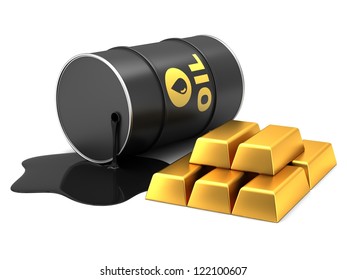- Ghana’s Gold-for-Oil Bet Backfires: Forex Losses Hit Bank of Ghana’s 2024 Accounts
The Bank of Ghana’s 2024 financial statements reveal a sobering reality: the country’s then-thought-out innovative “Gold for Oil” program, designed to ease foreign exchange pressures on petroleum imports, cost the central bank GH¢1.82 billion in exchange losses alone. This figure, within the institution’s overall GH¢3.49 billion revaluation and exchange losses, exposes the complex trade-offs facing emerging market central banks as they navigate between monetary stability and economic pragmatism.
When Ghana launched the Gold-for-Oil initiative in December 2022, petroleum prices had surged from GH¢6.90 per litre to GH¢22.80 within a single year. The programme promised an elegant solution: leverage the country’s abundant gold production to secure petroleum imports without depleting scarce foreign currency reserves. Yet the Bank of Ghana’s latest figures suggest this monetary alchemy comes at a steeper price than initially anticipated.
The numbers tell a story about ambitious policymaking meeting market reality. While the Bank of Ghana recorded an overall improvement in its financial position, reducing its operating loss from GH¢13.23 billion in 2023 to GH¢9.49 billion in 2024, the Gold-for-Oil programme’s forex losses represent nearly 20 per cent of the institution’s total operating income of GH¢9.40 billion.
These losses arise from the complex mechanics of converting domestically purchased gold into petroleum products through international markets, exposing the central bank to multiple currency and commodity price risks. Each transaction requires navigating volatile gold prices, fluctuating exchange rates, and petroleum market dynamics, a triangulation that can quickly erode value when markets move unfavourably.
The scale of these losses is particularly striking when viewed against the Bank’s successful core mandate. The institution’s aggressive monetary policy, costing GH¢8.60 billion in open market operations, successfully reduced inflation from 54.1 per cent to 23.2 per cent between December 2022 and December 2023. The Gold-for-Oil programme, by contrast, has yet to demonstrate commensurate returns for its foreign exchange costs.
Beyond the Balance Sheet
The programme’s broader implications extend far beyond the Bank of Ghana’s profit and loss statement. At its core, the Gold-for-Oil initiative represents a fundamental question about the role of central banks in emerging economies: should monetary authorities prioritise narrow price stability mandates or actively support government efforts to achieve energy security and economic sovereignty?
Traditional central banking orthodoxy suggests the former. The Bank for International Settlements’ guidance on central bank mandates emphasises a a clear separation between monetary policy and fiscal operations. However, Ghana’s experience mirrors the reality faced by many African central banks, where economic development imperatives frequently blur these theoretical boundaries.
The programme’s forex losses also highlight the persistent challenges facing commodity-dependent economies seeking to diversify their foreign exchange earnings. While Ghana’s strategy of monetising gold production for energy imports appears logical in principle, its execution reveals the difficulty of creating efficient commodity-to-commodity trading mechanisms in globally integrated financial markets.
The Sovereignty Premium
Perhaps most significantly, the Gold-for-Oil programme’s costs should be viewed as a “sovereignty premium”—the price Ghana pays for reduced dependence on traditional foreign exchange markets for critical energy imports. This premium extends beyond immediate financial costs to encompass reduced vulnerability to external payment system disruptions and decreased reliance on foreign currency borrowing for essential imports.
The programme’s strategic value becomes clearer when considering Ghana’s broader economic context. The country’s participation in the IMF’s Extended Credit Facility programme, with its emphasis on fiscal consolidation and debt sustainability, limits the government’s ability to finance petroleum imports through conventional borrowing. The Gold-for-Oil initiative provides an alternative pathway that, while costly, preserves fiscal space for other priorities.
Market Lessons and Future Adaptations
The Bank of Ghana’s experience provides insightful lessons for other commodity-rich nations considering similar initiatives. The GH¢1.82 billion in forex losses suggests that successful commodity-swapping programmes require sophisticated risk management frameworks and possibly smaller, more gradual implementation phases.
The central bank’s overall financial improvement in its 53 per cent asset growth to GH¢215.06 billion demonstrates continued operational strength, indicating that the institution retains the capacity to absorb these transitional costs while refining the programme’s mechanics. Future iterations might incorporate more extensive hedging strategies, diversified commodity portfolios, or partnerships with regional central banks facing similar challenges.
The ultimate verdict on the Gold-for-Oil programme awaits further data, but the Governor of the Bank of Ghana, Dr Johnson Pandit Asiama, is committed to transparency in reporting the Bank’s costs and dealings to the public, demonstrating the institution’s dedication to accountability even as it ventures into unorthodox policy territory. In an era of increased economic nationalism and supply chain regionalisation, such transparency may prove as valuable.
But it is important to state that the Bank of Ghana has redrawn from the Gold-for-Oil programme, as stated in the 2024 financial report published. “In view of the material losses, the Board of Directors, at its meeting held on March 13th, 2025, approved the bank’s redrawal from the program.”
NOTE: The author analyses central banking and monetary policy developments. The views expressed are personal and do not represent any institutional affiliation. You can reach the author via email at norvaay@gmail.com.








we needs to buy Gold send me your Gold details with selles prosugers